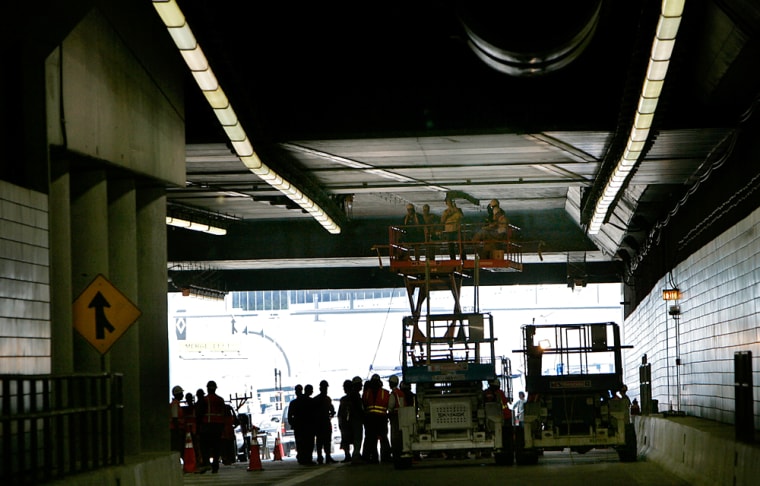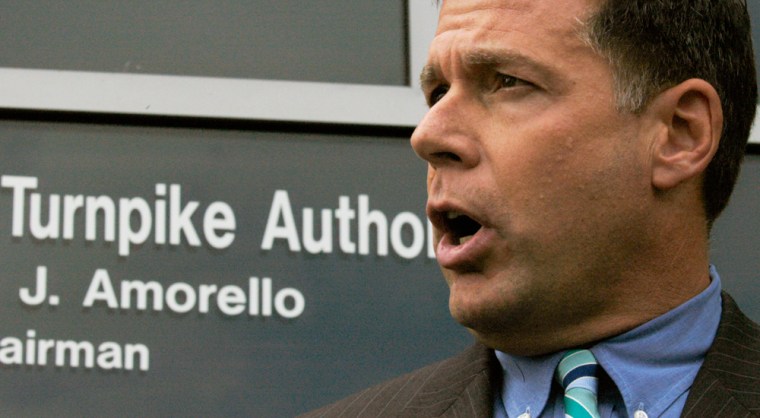The Massachusetts Turnpike Authority chairman, under fire since 12 tons of falling concrete killed a woman in a Big Dig highway tunnel, resigned Thursday after weeks of pressure from the governor.
In an agreement with the state, Matthew Amorello has until Aug. 15 to clean out his office, but he will continue to be paid his $223,000 annual salary through February.
He also avoids a hearing scheduled Thursday during which he would have been deposed — under oath — at a time when federal and state officials are conducting criminal investigations into the deadly collapse.
“I think this is good news for the commonwealth, the right step for Matt Amorello to have taken,” Gov. Mitt Romney said. “Clearly it will save the taxpayers and the rate-payers the cost of an extensive legal battle, and it also allows the citizens and toll-payers to have confidence again in the Turnpike Authority.”
Lawyers for Amorello and Romney hammered out details of his resignation agreement late Wednesday, after Supreme Judicial Court Justice Francis X. Spina ruled Romney could go forward with the administrative process to remove Amorello.
Romney said Thursday that he would search for a new Turnpike Authority chairman outside the political arena but had no specific candidate.
“I want somebody who knows how the wheels of automobiles and trucks turn and how engineers can do a fine job finishing the work of the Big Dig,” he said.
Warning of problems
On Wednesday, the Boston Globe report that the on-site safety officer warned his superiors in 1999 that the heavy ceiling panels might collapse because the bolts could not support them.
John Keaveney wrote in a two-page memo to a senior project manager for contractor Modern Continental Construction Co. that he could not “comprehend how this structure can withhold the test of time.”
“Should any innocent State Worker or member of the Public be seriously injured or even worse killed as a result, I feel that this would be something that would reflect Mentally and Emotionally upon me, and all who are trying to construct a quality Project,” he wrote.

In an interview with the Globe, Keaveney said his superiors at Modern Continental and representatives from Big Dig project manager Bechtel/Parsons Brinckerhoff assured him that such a system had been tested and was proven to work.
Andrew Paven, a spokesman for Bechtel/Parsons Brinckerhoff, declined to comment on the report Wednesday.
Modern Continental had no specific comment Wednesday. A spokesman referred to an earlier statement in which the company said it was cooperating fully and was confident the work fully complied with plans and specifications.
‘A record of poor maintenance’
The tunnel where the woman was killed is part of Interstate 90 that the $14.6 billion Big Dig project buried under south Boston. It leads to the Ted Williams Tunnel, which runs under Boston Harbor to Logan Airport.
Both tunnels, as well as ramps, were closed to most traffic after the ceiling panels collapsed and inspectors discovered hundreds of problem bolts in their ceilings.
Investigators have been focusing their attention on the bolt-and-epoxy system holding up the ceiling panels, which weigh about 3 tons in the portion of the tunnel where the ceiling collapsed.
Keaveney told the Globe his memo reflected collective concerns among ironworkers installing the ceiling and other Modern Continental employees.
He wrote that the weight of the suspended panels appeared to be “excessive,” given that the bolts were “only inserted into concrete with epoxy.”
He also wrote that while workers were following specifications, he worried that when the state took control of the tunnel, maintenance might be neglected.
“My concerns are for that of the State when they assume control. They have a record of poor maintenance, and I just can envision that these sections will not receive the constant vigilance it would require,” he wrote.
‘The emperor has no clothes’
Keaveney, 43, was paid a salary of $70,000 as the head of on-site safety in the I-90 connector. The letter was mailed to a Globe reporter without his knowledge.
Keaveney said his worry increased when a school group from his hometown toured part of the Big Dig project in 1999. He showed them some concrete ceiling panels and pointed to the bolts in the ceiling, explaining that the panels would one day hang from those bolts.
He said a third-grade girl raised her hand and asked: “Will those things hold up the concrete?”
Keaveney said he shared his concerns with colleagues and then managers. “It was like the (third-graders) had pointed out the emperor has no clothes,” he said.
